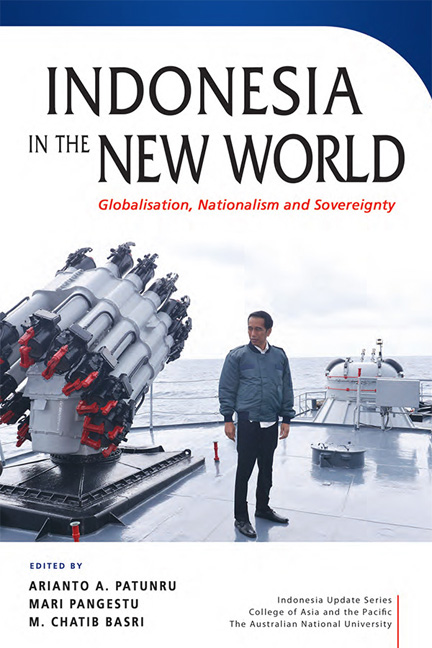Book contents
- Frontmatter
- Contents
- Tables
- Figures
- Contributor
- Acknowledgments
- Glossary
- 1 Challenges for Indonesia in the new world
- PART 1 Globalisation, Nationalism and Sovereignty: the Indonesian Experience
- PART 2 Nationalism in Practice
- 5 Feeding the bangsa: food sovereignty and the state in Indonesia
- 6 Nationalism, developmentalism and politics in Indonesia's mining sector
- 7 Who is afraid of economic openness? People's perceptions of globalisation in Indonesia
- PART 3 Impact of and Response to Globalisation
- PART 4 The Human Face of Globalisation
- PART 5 Navigating The New Globalisation
- Index
- INDONESIA UPDATE SERIES
7 - Who is afraid of economic openness? People's perceptions of globalisation in Indonesia
from PART 2 - Nationalism in Practice
Published online by Cambridge University Press: 08 June 2019
- Frontmatter
- Contents
- Tables
- Figures
- Contributor
- Acknowledgments
- Glossary
- 1 Challenges for Indonesia in the new world
- PART 1 Globalisation, Nationalism and Sovereignty: the Indonesian Experience
- PART 2 Nationalism in Practice
- 5 Feeding the bangsa: food sovereignty and the state in Indonesia
- 6 Nationalism, developmentalism and politics in Indonesia's mining sector
- 7 Who is afraid of economic openness? People's perceptions of globalisation in Indonesia
- PART 3 Impact of and Response to Globalisation
- PART 4 The Human Face of Globalisation
- PART 5 Navigating The New Globalisation
- Index
- INDONESIA UPDATE SERIES
Summary
Protectionism and anti-globalisation are on the rise again. Protectionism has been rising since the global financial crisis in 2009, and populist and nationalist tendencies, especially in the United States, have escalated anti-globalisation to a whole new level. The World Trade Organization reported a significant increase in the number of trade-restrictive measures introduced by G20 countries, from a total of 381 in October 2010 to 1,671 in October 2016 (WT0 2016: 4). This is particularly worrying considering that trade growth has stagnated at the same time.
The vote in the United Kingdom in June 2016 to leave the European Union and the presidential election result in the United States in Novem¬ber 2016 caught everyone by surprise. In the former case, the popular vote to leave an economic bloc that has provided many benefits for the British economy was difficult to understand and seemed to run counter to the national interest. In the latter case, Donald Trump's promise to ‘make America great again’ by changing trading rules that he considered did not benefit the United States clearly struck a chord with many Americans. Since he came to office in January 2017, the United States has withdrawn from the Trans-Pacific Partnership (TPP), reopened negotiations on the North American Free Trade Agreement (NAFTA) and the Korea–US Free Trade Agreement (KORUS), unilaterally imposed tariffs on a number of products in the name of ‘fair trade’ and ‘national security’, and signalled that the United States will not abide by WTO rulings. More than any other country, China has been targeted due to its large trade deficit with the United States and its alleged theft of intellectual property rights. These events are indications of a contagious new populism and nationalism that may affect other parts of the world, especially with the retreat of the United States from being the champion of an open world economic order.
Indonesians had an ambivalent attitude towards economic openness even before the rise of the anti-globalisation movement in advanced coun¬tries. The increase in trade restrictions in Indonesia since 2001 has been referred to as ‘creeping protectionism’ (Basri and Patunru 2012; Patunru and Rahardja 2015).
- Type
- Chapter
- Information
- Indonesia in the New WorldGlobalisation, Nationalism and Sovereignty, pp. 109 - 130Publisher: ISEAS–Yusof Ishak InstitutePrint publication year: 2018

